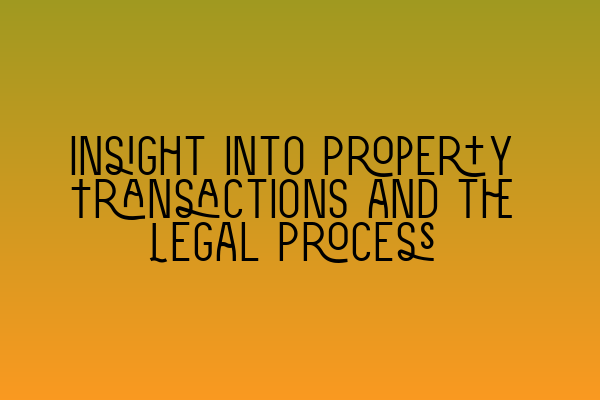Insight into Property Transactions and the Legal Process
Property transactions are complex legal processes that require the expertise of a skilled solicitor. Whether you are buying or selling a property, it is important to understand the legal steps involved and the role of a solicitor in facilitating the transaction. In this blog post, we will provide valuable insight into property transactions and the legal process.
Understanding the Legal Framework
Property transactions in the UK are governed by a comprehensive legal framework that includes statutes, regulations, and common law principles. It is crucial to have a clear understanding of these legal provisions to ensure compliance and protect your interests.
One of the essential documents in a property transaction is the contract, which sets out the terms and conditions of the sale. Your solicitor will review and negotiate the contract on your behalf, ensuring that it is fair and protects your rights. It is important to consult a solicitor experienced in property law to guide you through the contract negotiation process.
Additionally, your solicitor will conduct various searches to uncover important information about the property, such as ownership disputes, restrictions, or planning permissions. These searches are essential to ensure that there are no hidden issues that may affect your ownership or use of the property.
The Role of a Solicitor
A solicitor plays a crucial role in a property transaction, acting as the intermediary between the buyer and seller. They are responsible for ensuring that the transaction is legally valid and protecting the interests of their clients.
Firstly, your solicitor will guide you through the entire process, explaining the legal steps, and addressing any concerns or questions you may have. They will review and advise you on all the legal documents involved in the transaction, providing you with the necessary information to make informed decisions.
Furthermore, your solicitor will conduct thorough due diligence to identify and address any potential issues with the property. This may include checking for outstanding mortgages, liens, or easements that may affect your ownership and use of the property. They will also ensure that all necessary regulatory requirements, such as obtaining consent from relevant authorities, are met.
Throughout the transaction, your solicitor will handle all financial matters, including arranging for the transfer of funds and ensuring that all financial obligations, such as stamp duty, are met. They will also coordinate with other parties involved in the transaction, such as estate agents and mortgage lenders.
Conclusion
Property transactions can be complex and require expertise in property law. Engaging the services of an experienced solicitor is crucial to ensure that your rights are protected and the transaction proceeds smoothly. By understanding the legal framework and the role of a solicitor, you can navigate the property transaction process with confidence.
If you’re looking for more resources to support your legal studies or preparation for the SQE exams, check out these related articles:
